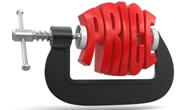Prices

August 2, 2018
High Steel Prices Strain Customers’ Credit Limits
Written by Tim Triplett
Boosted by the Trump tariffs, the high price of steel in the U.S. tends to mask other issues. Notably, strained credit limits. While mills report record profits, some of their customers report cash flow issues that threaten their very viability.
Steel Market Update canvassed the market this week and gathered the following observations from steel executives in distribution and manufacturing:
- “We are seeing the normal July summer slowdown. A number of customers are behind on payments and we have more companies on credit hold than ever in the past. The pricing of steel has risen to a point they are unable to pass it on to their consumers, so they are running inventory way down and spot buying only what they need that week. It’s very concerning, hearing Nucor having its second best month in history, then talking with over 50 small and medium-sized manufacturers that are struggling to pay the bills because the banks refuse to extend their credit lines further. Tariffs and Section 232 have done the job intended—the rich are getting richer and the heartbeat of American Manufacturing is struggling to make ends meet. So much for a fair and level playing field.”
- “I think the ability to pass on increased costs and increased credit lines are linked very closely. Banks would normally see the whole picture and—assuming that a customer faced with increased costs is charging (and getting) more—would realize it’s just a matter of needing higher cash levels to run the business. But due to the enormous variety of manufacturers out there, some can raise prices with minimal lag time, while others are tied into annual (or longer) contracted prices. The latter are typically the large OEMs, who face higher hurdles when attempting to raise prices because they have global competition. In a strange twist, many manufacturers need prices to remain elevated for an extended period in order to have better luck in getting increases to stick. In the prior bull markets, they knew they just had to ride out the storm until the prices corrected. This time around, I don’t believe they will get the relief that a big price correction would otherwise provide.”
- “We are seeing a few issues with late pay, but very restricted in nature. Our late pays are tied to a couple of customers that overextended their ability to pay due to a large pre-buy in an effort to avoid the tariffs. In our markets, we are seeing the pricing as leveled, and demand is still fairly strong. I agree, things are not good for the end user. It’s a real squeeze.”
- “Higher prices are impacting credit limits. However, I believe companies are managing. Everyone has pushed the increases along. There is a pause in the market as people believe we have been at the peak of the current cycle and there is more downside risk than upside in the future. As far as the mills’ behavior, they continue to act as they have in the past. They always push price whenever the market allows them to.”
- “Credit issues have occurred before when we’ve had these sorts of runups. This is not just a Section 232 issue. But we’ve seen where customers are maximizing their credit lines and then moving part of their business elsewhere.”
- “Non-healthy businesses get healthy in times like this, which isn’t necessarily a good thing. Inefficient assets are just that, unless dollars are poured into them to become viable when the downturn occurs (and it will). Money is being made—how it’s being managed is a different challenge that each company fights through.”
- “The credit issue is causing problems with us, as well. Something has to give. Tariffs on steel do nothing unless products made of steel are included. I believe China needs us more than we need them, resulting in some type of compromise that ultimately will benefit everyone in the U.S. We shall see.”
- “Unfortunately, our government has chosen who will be the winners and who will be the losers. What makes for bold headlines will win the day. In the case of farmers who are being hammered by export tariffs, let’s just give them $12 billion (a government subsidy) and hope they still vote Republican. It’s ironic that this trade talk all started based on foreign governments subsidizing industries, but now we are doing the same thing.”







